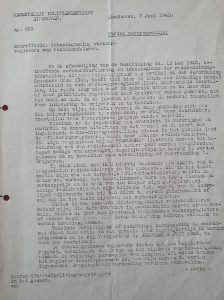
The following account of my father’s arrest and imprisonment came about thanks to the cooperation of Ben Morshuis. I have supplemented information from his book: Ootmarsum 1940- 1945 with my own information, stories that I immediately heard from my father and from the archival documents he has left behind.
Ben begins his story with a description of the local situation surrounding the confiscation of the radio sets. This event was also recorded by Anny in her diary on that day as follows:
Notice: All radio sets must be returned. What a pity. But one day comes the retribution. “How difficult the battle and how tough the times. We are one day closer to liberation.” On June 9, she mentions that they must also hand in their radio on that day. But one set was hidden in the attic of the timber store.
Public communication: Handing in radio sets – 13 May 1943
| “Pursuant to the order of the Befehlshaber der Sicherheitspolizei of 13 May 1943, all radio receivers and any spare parts in the occupied Dutch territory will have to be handed in with effect from 13 May 1943 and must bebrought to the Town Hall within the following period.
In the event of a violation of the decision, police summary execution shall apply. A card with the name must be attached to the devices. Hand-in takes place on 7, 8 and 9 June. Radio shops must draw up an inventory list of the radio receivers and parts in their possession and hand them in to the mayor before 10 June.” May 13th, 1943 Mayor Schimmelpenninck van der Oye |
With the above public communication, the mandatory handing in of radio sets also began in Ootmarsum. This only concerned the radio receivers, because with them, among other things, the English radio channels and the forbidden Radio Oranje could be listened to.
Connections to the cable-based radio distribution system were allowed to be kept, as this system was under the control of the occupying force.
Some refused to follow the order to hand in their radio set and hid it: under the floor, behind a cupboard, in a hayloft, etc. To comply, an old, discarded radio was sometimes brought to the town hall. A total of 127 people complied with the first call for hand-ins in Ootmarsum. Of those 127, some had to be returned to café owners and to members of the NSB.
The Germans were apparently not satisfied with this result and opened a second surrender period until 20 October 1943. That resulted in another 3 sets. In the end a total of 128 radio sets were at the council chamber at the end of October.
Herman warns radio dealers
For Herman, the affair surrounding the handing in of radio sets had unpleasant consequences and even almost a fatal outcome.
In May 1943, the Police President in Arnhem sent the above secret letter to the mayors of the municipalities.
It stated the impending overall confiscation of radio receivers. Herman, however, working at the Town Hal, became aware this letter. Warning all the inhabitants of Ootmarsum, of course, was not possible.
However, he was able to inform the radio dealers of the upcoming Nazi order. These dealers ran a so-called merchant’s book, which listed to whom they had sold radio sets over the years. If the occupier got hold of these merchant books, it would be very easy to find out who had a radio set and it would be difficult for people to secretly keep this device.
Herman then secretly told a radio dealer in the nearby village of Rossum what was about to happen and that the merchant’s books had to be destroyed or at least well hidden.